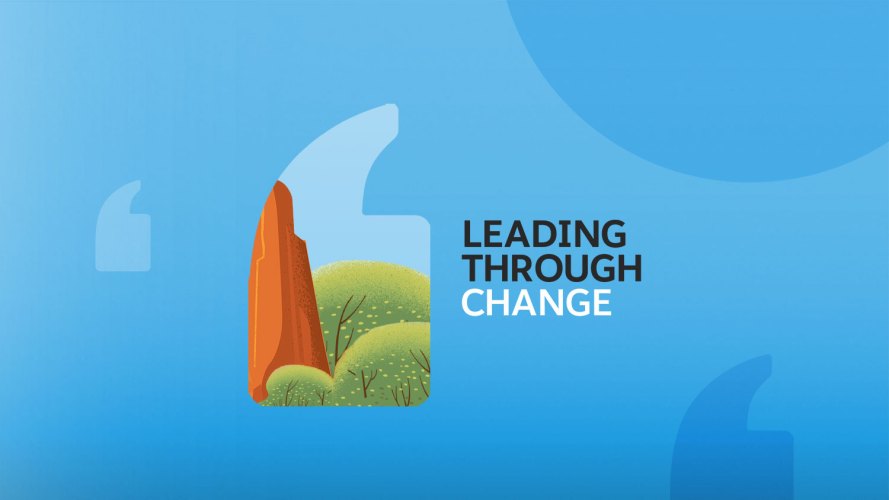Distraught following the murder of George Floyd, Fox Sports Analyst Emmanuel Acho was inspired to use his platform to help people find the language to discuss race. He said, “There is a fracture in communication between my white brothers and sisters and my Black brothers and sisters.” Through his new series “Uncomfortable Conversations With a Black Man,” Acho aims to bridge the gap through honest conversations with leaders like Matthew Mcconaughey and Oprah.
In a recent Leading Through Change conversation, we were joined by Emmanuel Acho (EA) and David A. Thomas, Ph.D., (DAT) president of Morehouse College, and coauthor of three books on leadership and diversity. They discussed how we can create a more equitable future by investing in the next generation and facilitating conversations that open minds.
The following are highlights from the conversation with Acho and Thomas, in their words. It is lightly edited for clarity.
Get comfortable with being uncomfortable
Emmanuel Acho (EA): No one cares what you know, until they know that you care.
The need of this moment — in our society, in our world, in our country — has to outweigh each and every one of our personal discomforts. That’s how you move past the nervousness. The job we have right now is to mend racial fractures, and to solve racial inequality. It has to mean more to each and every one of us. We can no longer simply be non racist — we have to be antiracist. Being antiracist is seeing it and calling it out. It’s seeing it for what is and eliminating it.
Be ready to listen
EA: Don’t come into a conversation with preconceived notions — just let your guard down and be willing to listen. I firmly believe knowledge is power. We could all benefit from a little bit of knowledge — it just might not be knowledge that’s inherent to us. So try to get what benefits you can from open and honest true conversations.
I was encouraged by the dialogue [I’ve had through this project] because, more than anything, what we need in America is for people of power — white people of power — to be willing to sit at the table. To be willing to have a bigger conversation. The fact the commissioner of the National Football League called me and said “Emmanuel, I want to have an uncomfortable conversation.” That was all I needed to hear. I was floored, and it was powerful.
Building morally conscious leaders
David A. Thomas (DAT): The idea of Black male excellence at scale is an idea that the world needs to know is possible. And you can come to Morehouse and see it.
It’s not simply that you [Black students] are excellent, but it’s also about how you become excellent, and how you exhibit that excellence. It’s about the notion of service. And it doesn’t matter if you become a doctor or a lawyer or you’re out saving the whales. You’re doing it in a way that benefits the community.
We’re not ethically relativist. We believe there is something called right and wrong, and justice. And from the time our students step on the campus. They are introduced to that idea.
Acknowledging privilege and seeking diversity
EA: The topic of white privilege ruffles people’s feathers the most, but it is the entry level of education to having this conversation [about racism]. We must first acknowledge [white] privilege does exist. Once we acknowledge white privilege does exist — it’s like buying a ticket to the fair. Now you can go through and truly have a conversation to break the mold.
White privilege is simply saying your skin color grants you certain access that people who aren’t white don’t have access to. That’s not to say that your life has not been hard — it’s simply to say your skin color hasn’t contributed to that difficulty.
If you don’t live a life that’s very culturally diverse, then seek that knowledge in your movies, in your books, in your reading articles. If you consciously choose to live a life only with people that look like you, and only have friends that are exactly identical to you, that doesn’t benefit you — nor does it benefit the world around you.
Building a culture of inclusion
DAT: If you identify as a man, in your own definition, you are welcome to apply and matriculate at Morehouse regardless of your assigned gender at birth.
Man is a gender identification. Male is a sex identification determined by a doctor at birth. Gender is really about how you identify and how you want to live your life. And there are many expressions of it. And so we arrived at the conclusion that Morehouse admits those who identify as men. We’re agnostic about how you express that identification.
I received a lot of correspondence from people who told me how important it was that Morehouse as an institution in the Black community made that statement. It really said something about this college and statements we make about what Dr. King, when he said “the arc of the moral universe is long, but it bends toward justice.”
To learn more, watch the full interviews with Morehouse College President Dr. David A. Thomas and Emmanuel Acho at the link below.
Emmanuel’s debut book “Uncomfortable Conversations with a Black Man” launches on November 10. Preorder your copy.
You can also pickup, Dr. Thomas’ latest book “Race, Work, and Leadership: New Perspectives on the Black Experience.”
This conversation is part of our Leading Through Change series, providing thought leadership, tips, and resources to help business leaders manage through crisis. Prior video interviews include:
- Embracing the future of education with Dr. Kyla Johnson-Trammell and Stephen and Ayesha Curry
- Honoring Pride with Janelle Monáe and Megan Rapinoe
- Taking action against racial injustice with Mellody Hobson, Soledad O’Brien, and LL COOL J





























